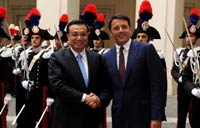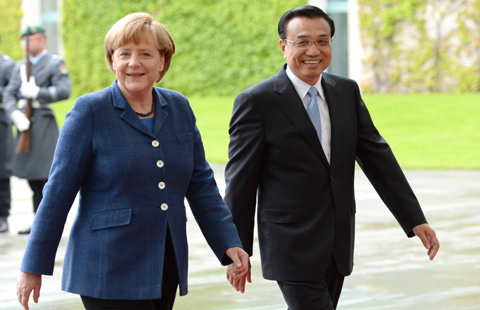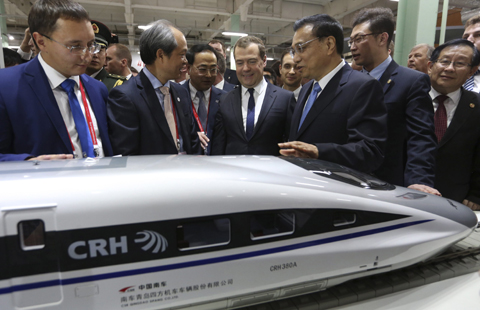Italian experts urge more efforts for cooperation with China
ROME -- Italian experts on Tuesday called for more efforts from their country to seize the increasing opportunities offered by China during Chinese Premier Li Keqiang's official visit to Italy.
During the visit, Chinese and Italian companies signed deals worth 8 billion euros ($10 billion), which experts said once again reflects China's profound interest in Italy.
 |
| China ready to deepen strategic cooperation with Italy |
 |
| Italy touts land of 'surprises' |
Airaldo Piva, CEO of the Milan-based Hengdian Group Europe, said that the agreements signed during China-Italy official visits are important, stressing that it is "a starting point rather than an end point."
There is some important transformation going on in China, Piva said. "China's middle class is increasingly expanding and generating new consumption that Italian companies should strive to seize," he said.
Environment protection, an issue which is increasingly important in China, could become a driving force of new bilateral cooperation, Piva said.
"Italy, which really has a lot to offer besides being culturally close to China, must do more to attract the huge flows of Chinese tourists who are travelling the world," he said.
Italy's production system is essentially based on small and medium-sized enterprises (SMEs). In Piva's view, it would be better for Italy to support medium-sized companies to invest in Chinese market.
UNDERSIZED ECONOMIC RELATIONS
China-Italy economic relations are undersized in terms of the economic potential of the two countries, said Carlo Filippini, professor of economics and director of the Center for East Asian Economic and Social Studies at Bocconi University in Milan.
"Less than 1 percent of Italy's total exports, for example, are destined to China. Italian foreign direct investments (FDI) into China are also relatively low," he said, adding that Italy has consistent trade deficits with China.
"In the past few years, China's interest in Italy has visibly grown. In recent months there have been many media reports of China's financial investments in Italian utilities and investments of Chinese companies into Italian manufacturing companies," Filippini noted.
Why is it difficult to seize China's many potential opportunities? The reasons are quite simple, he said. "Italy only has a few big companies. Small companies are not often endowed with very high technology or strong financial capacity, which makes internationalization rather hard."
Another difficulty, the professor added, lies in "the protection of property rights, which, despite China's notable progress in this regard, is still quite a delicate issue in Italy's dialogue with China."
BETTER INVESTMENT ENVIRONMENT
Alessia Pastori, a lawyer and co-director of China Desk at the Milan-based Gianni Origoni Grippo Cappelli & Partners, emphasized the need of a more comfortable legal framework in Italy.
Pastori, who has worked in close contact with Chinese companies for nearly 10 years, hoped that Italy would build up a better investment environment "to ensure that bilateral agreements do not only remain on paper but transform into successful business operations."
"As a legal firm, we see huge potentials and opportunities for Italy from China's capital flows, which unfortunately are not sufficiently understood or exploited by the Italian slow-moving system," said the lawyer.
"Regulatory and fiscal simplification are the right way to overcome these problems," she said, explaining that taxes and notarial fees in Italy are relatively high so that many Chinese investors tend to choose other European countries to start their business in Europe.
"I have recently experienced China's increasing interest in Italy and also a more detailed demand from Chinese investors. But unfortunately I cannot see the same improvement in the Italian attitude," Pastori said.
"Italy has to work more on seizing China's momentum," she added.
Related Stories
Premier Li Keqiang promotes innovation in Moscow speech 2014-10-15 09:15
More two-way investment benefits China, Italy: Premier Li 2014-10-15 04:33
Premier Li Keqiang's global tour to promote Chinese railways 2014-10-14 09:50
Premier Li vows to safeguard WWII victory with Russia 2014-10-14 00:30
Premier Li lays wreath at Tomb of the Unknown Soldier 2014-10-13 22:37
Premier Li begins his Russia visit 2014-10-13 02:34
Premier Li arrives in Russia for official visit 2014-10-12 18:51
Premier Li visits Germany, Russia, Italy 2014-10-12 18:01
Background







